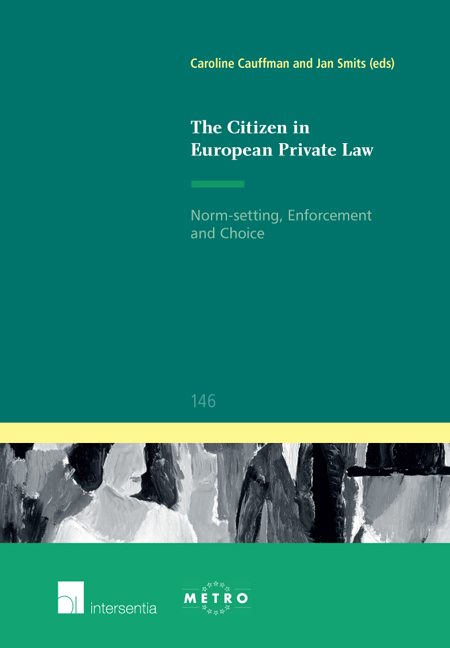Book contents
- Frontmatter
- Contents
- List of Authors
- List of Abbreviations
- Preface
- Introduction
- Part I Choice and Regulatory Competition
- Part II Norm-Setting and Enforcement
- Private Actors as Norm-Setters through Choice-of-Law: The Limits of Regulatory Competition
- Private Norm-Setting in Family Law, More Specifically: Private Norm-setting amongst Religious Communities in Family Law Issues
- Enchained Marriages: Is there a Way out?
- An Introduction to Alternative Dispute Resolution (ADR) for Consumers in Europe
- Critical Remarks on the ADR Directive
- Normative Frameworks in Commercial Dispute Resolution: The Role of Legal and Non-legal Norms in Mediation and Adjudication
- Law or Social Ordering: A Choice for Commercial Parties in Dispute Resolution? A Comment on Kornet
- Ius Commune Europaeum
Private Norm-Setting in Family Law, More Specifically: Private Norm-setting amongst Religious Communities in Family Law Issues
from Part II - Norm-Setting and Enforcement
Published online by Cambridge University Press: 21 September 2018
- Frontmatter
- Contents
- List of Authors
- List of Abbreviations
- Preface
- Introduction
- Part I Choice and Regulatory Competition
- Part II Norm-Setting and Enforcement
- Private Actors as Norm-Setters through Choice-of-Law: The Limits of Regulatory Competition
- Private Norm-Setting in Family Law, More Specifically: Private Norm-setting amongst Religious Communities in Family Law Issues
- Enchained Marriages: Is there a Way out?
- An Introduction to Alternative Dispute Resolution (ADR) for Consumers in Europe
- Critical Remarks on the ADR Directive
- Normative Frameworks in Commercial Dispute Resolution: The Role of Legal and Non-legal Norms in Mediation and Adjudication
- Law or Social Ordering: A Choice for Commercial Parties in Dispute Resolution? A Comment on Kornet
- Ius Commune Europaeum
Summary
This chapter deals with questions on marriage and divorce in situations where people possess strong affiliation to religious family values and at the same time possess affiliation to the formal state law. More specifically, the question will be raised if, how and to what extent a state law system should accommodate private norm-setting in order to enable people to rely on informal religious marriage laws.
Throughout Europe, there are people and communities that observe a particular religious belief and respect the binding force of the rules, norms and values of that religious belief. Religions usually also provide rules directly affecting family law issues, such as rules on marriage and divorce. Not in all cases and not everywhere are these religious rules also formally respected and recognized by the national legal system. Where religious rules – and the same goes for cultural norms – do not have legal validity, they only operate at an informal level, within not legally recognized religious law, within the religious communities themselves. Marriages entered into according to the rules and rituals prescribed by a particular faith by adherents of that faith, continue to be a frequent occurrence. This holds true for all types of believers: Christians conclude their marriage in Church, Jews marry according to the laws of Judaism, Muslims marry in a mosque, or elsewhere, according to Islamic rites, to name but a few.
Religious Marriages: Legal Validity
In the Netherlands, religious marriages are allowed, provided they are preceded by a civil marriage. A religious marriage by itself has no formal legal validity. Only a civil marriage is valid under the law. In other countries, religious marriages are governed by law in various ways. Several other European States also require a religious marriage to be preceded by a civil marriage. Belgium, France, Luxemburg, Austria, Switzerland, and Turkey are amongst such States. Germany has abolished its prohibition against entering into a religious marriage prior to a civil marriage. Many other States allow religious marriages and only may require subsequent civil registration. In those situations an arrangement must be provided that guarantees that civil authorities will be informed about the religious marriage, e.g. by the religious authorities. Religious marriages in this sense are allowed in a couple of Southern European States, the United Kingdom, and a few Scandinavian countries.
- Type
- Chapter
- Information
- The Citizen in European Private LawNorm-Setting, Enforcement and Choice, pp. 121 - 132Publisher: IntersentiaPrint publication year: 2016



